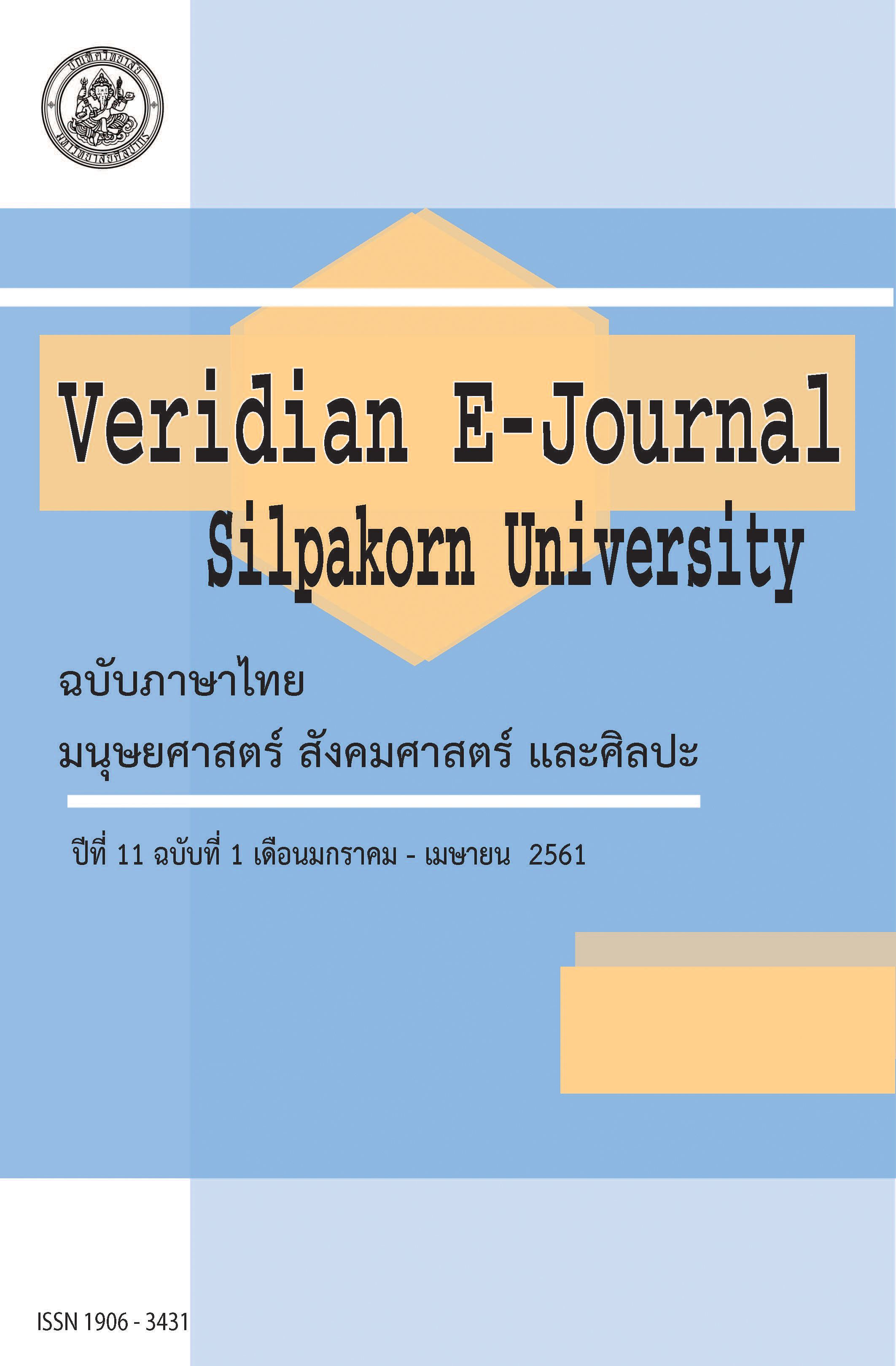การพัฒนารูปแบบการจัดการเรียนรู้เพื่อพัฒนาทักษะการสื่อสารทางวิชาชีพเภสัชกรรมสำหรับนักศึกษาเภสัชศาสตร์ตามทฤษฎีการเรียนรู้สู่การเปลี่ยนแปลง (Development of the Instructional Model to Enhance Communication Skills for Pharmacy Students based on Transformative)
Main Article Content
Abstract
งานวิจัยนี้มีวัตถุประสงค์เพื่อ 1) พัฒนารูปแบบการจัดการเรียนรู้เพื่อพัฒนาทักษะการสื่อสารทางวิชาชีพเภสัชกรรมสำหรับนักศึกษาเภสัชศาสตร์ตามทฤษฎีการเรียนรู้สู่การเปลี่ยนแปลงและ 2) ศึกษาประสิทธิผลของรูปแบบการจัดการเรียนรู้ที่ผู้วิจัยสร้างขึ้น ใช้แบบแผนการทดลองแบบการวิจัยและพัฒนาโดยแบ่งออกเป็น 4 ขั้นตอนคือ 1) การสร้างรูปแบบการจัดการเรียนรู้ 2) การสร้างเครื่องมือที่ใช้ในงานวิจัย 3) การศึกษานำร่องเพื่อศึกษาความเป็นไปได้ของรูปแบบการจัดการเรียนรู้ และ 4) การนำรูปแบบการจัดการเรียนรู้ไปใช้เพื่อศึกษาประสิทธิผลของรูปแบบ กลุ่มตัวอย่างที่ใช้คือ นักศึกษาชั้นปีที่ 5 ปีการศึกษา 2559 คณะเภสัชศาสตร์ มหาวิทยาลัยสยาม จำนวน 38 คนโดยการเลือกแบบเฉพาะเจาะจง เครื่องมือที่ใช้ในงานวิจัย ได้แก่ แผนการจัดการเรียนรู้ แบบวัดทักษะการสื่อสารทางเภสัชกรรม และใบงานบันทึกการเรียนรู้ ใช้การวิเคราะห์ความแปรปรวนทางเดียวแบบวัดซ้ำและการวิเคราะห์เนื้อหาในการวิเคราะห์ข้อมูล
ผลการศึกษาพบว่า 1) องค์ประกอบทักษะการสื่อสารทางเภสัชกรรมสำหรับนักศึกษาเภสัชศาสตร์ ประกอบด้วย 2 องค์ประกอบคือ ทักษะการสื่อสารเพื่อการดูแลแบบเน้นผู้ป่วยเป็นศูนย์กลางและทักษะการสื่อสารแบบอวัจนภาษา 2) ผลการพัฒนารูปแบบการจัดการเรียนรู้ ประกอบด้วย หลักการ วัตถุประสงค์ กระบวนการของรูปแบบ 6 ขั้นตอน ได้แก่ การจัดประสบการณ์การเรียนรู้ การใคร่ครวญอย่างมีวิจารณญาณ สุนทรียสนทนา การจัดประสบการณ์การเรียนรู้ซ้ำ เปรียบเทียบผลการทำกิจกรรม การนำเสนอแนวคิดเพื่อการเรียนรู้ร่วมกัน 3) ประสิทธิผลของรูปแบบการจัดการเรียนรู้พบว่า นักศึกษามีพัฒนาการของทักษะการสื่อสารจากครั้งที่ 1-4 สูงขึ้นโดยมีคะแนนเฉลี่ยทักษะการสื่อสารหลังทดลองสูงกว่าก่อนการทดลองอย่างมีนัยสำคัญทางสถิติ (p < .05) ด้านประสิทธิผลของกระบวนการเรียนรู้ พบว่า บันทึกการเรียนรู้สามารถสร้างการใคร่ครวญอย่างมีวิจารณญาณและทำให้นักศึกษามีกระบวนการคิดวิเคราะห์ สามารถนำความรู้ไปประยุกต์ใช้ในการปฏิบัติงานได้ ส่วนวิธีสุนทรียสนทนาสามารถพัฒนาการฟังอย่างตั้งใจ การรับฟังความคิดเห็น ทำให้นักศึกษาได้แลกเปลี่ยนเรียนรู้กันภายในชั้นเรียนและเกิดการเรียนรู้ได้ตามทฤษฎีการเรียนรู้สู่การเปลี่ยนแปลง
The purposes of this research were 1) to develop the instructional model to enhance Communication Skills for Pharmacy students (CSP) based on transformative learning theory and 2) to evaluate the effectiveness of this model. The study was conducted under a research and development process dividing into 4 phases as follows: 1) developing the instructional model 2) Creating the research instruments 3) Establishing a pilot study to evaluate the feasibility of the model. 4) Implementing the instructional model to assess the effectiveness of the model. 38 people of fifth-year pharmacy students who were studying in the second semester of academic year 2016, Siam University were intentionally chosen to be the research sample by purposive sampling method. The research instruments were the learning management plan, communication skills in pharmacy practice test and critical reflection worksheet. The data were analyzed by using repeated measures ANOVA and content analysis.
The results show that 1) the components of CSP are patient-centered communication skills and nonverbal communication skills. 2) The Instructional model consisted of principle, objectives and process divided into 6 phases: experiential learning, critical reflection, dialogue, repeated experiential learning, lesson learned discussion and presentation. 3) The result of the instructional model effectiveness assessment showed that CSP average posttest scores were higher statistical significantly than those obtained from pretest (p < .05). Regarding to learning process efficiency, the journal writing was able to establish critical reflective thinking of the students, and improved their analytical thinking and applying knowledge for practical utilization. The dialogue, could also develop active listening skills of the students brought about lesson learned discussion and share ideas which are major components of transformative learning.
